You’re listening to Burnt Toast! This is the podcast about diet culture, anti-fat bias, parenting, and health. I’m Virginia Sole-Smith and today is such a fun episode, especially if you are someone who has been following my work for a while, and who listened to my very first podcast.
Because is here with us today!
For new listeners: Amy is the creator of Yummy Toddler Food, the wildly popular blog and Instagram and Internet empire about feeding your kids. She also writes the awesome Substack newsletter
. It’s super practical and often immediately solves my “what am I making for dinner” conundrum. So definitely subscribe to that, if you haven’t already.AND - Amy is the author of the brand new cookbook, Dinnertime SOS: 100 Sanity-Saving Meals Parents and Kids of All Ages Will Actually Want to Eat.
If you order Dinnertime SOS from the Burnt Toast Bookshop, you can get 10 percent off that purchase if you also order (or have already ordered!) Fat Talk! (Just use the code FATTALK at checkout.)
When she’s not busy solving dinner for us, Amy is also my very best friend! We met when we were just wee little baby women’s magazine assistants. We have really grown up together. We have gone through all of the things and she has just always so much fun to have on the podcast. Plus, I learn something genuinely super useful that makes my own parenting, especially around feeding my kids, just feel better and easier every time we hang out. You are going to love this episode. Here’s Amy!
PS. If you’re enjoying the podcast, make sure you’re following us (it’s free!) in your podcast player! We’re on Apple Podcasts, Spotify, Stitcher, and Pocket Casts! And while you’re there, please leave us a rating or review. (We like 5 stars!)
PPS. No podcast next week, but we’ll be back after Labor Day!
Episode 108 Transcript
Amy
It’s nice to see your face.
Virginia
I know, not just my texting. So, this is definitely a hotly requested episode. “When is Amy coming back on the podcast?” is a frequent listener question. So here you go, people. I made it happen. I got you Amy, so enjoy!
And we are talking about your new cookbook.
Amy
Yes, the book is called Dinnertime SOS: 100 Sanity-Saving Meals Parents and Kids of All Ages Will Actually Want to Eat and it is 100 recipes to help you feed your family at the end of the day when you would rather be doing all the other things, but everyone still needs to eat. It is through the lens of understanding that families are tired at that time of the day and also hungry. How do we make it realistic for parents to feed everyone, given all of the long list of challenges that we all have?
Virginia
I just have to say, there are other books that claim to help you with family dinner and I always have encountered them and felt very inadequate, because I think their goal is to help me cook from scratch more every night or to help me achieve some level of elegance on my table every night, to achieve some kind of vision.
Amy
To make this recipe.
Virginia
And this book is like, “I actually understand that you need to feed people and here is how you will do it.” And the food is still pretty! Like, the book is so, so pretty. The photos are gorgeous, the food looks amazing. But it’s doable in a way that so many cookbooks about dinnertime are not doable for me.
Amy
I made a lot of deliberate decisions about the types of ingredients that I was using, and also the methods. Because one complaint that I get—not specifically about my recipes, although sometimes it applies to me if I’m being honest—is the way that we creators sell recipes with the words “easy” and “quick.” It doesn’t take into consideration all of the thinking that you’ve done up until the point that you get the food out. There’s the time of finding all the ingredients and then, yes, there’s the cook time captured that may or may not be accurate, and then there’s all of the cleanup. So the time that we tell you that a recipe will take is not accurate. And the book doesn’t tell you how long it’s going to take you to find the ingredients in your kitchen, but the actual part of making the food is as streamlined as possible. I was like: How can I use a knife less? What can I not chop here and figure out a different thing that’s going to add flavor? What’s an easier way to do this? Could I do this if I was holding my three year old at the same time?
Virginia
I mean, the ingredients lists are short. We don’t talk enough about how long it takes me to find things in my kitchen, like how long it takes me to remember if I have that one specific Asian condiment that I bought for a recipe eight months ago and haven’t used since. And is it still good? Like, all of that. The book is so helpful and refreshing and just a really, really supportive approach to this very complicated topic.
I also love that right off the bat, in introduction very early on, you say that your starting point when deciding what’s for dinner is what do you want to eat. Which, yes, I mean, this goes back to when we did our Comfort Food podcast. We were very big on our mantra of “feed yourself first” as a way to survive family mealtime. So, I feel like I helped play a little small role in that being in the in the cookbook.
Amy
I have more energy to make something when I know I’m going to get to enjoy food that I like. Also it can reduce your feelings if someone else decides that they do not want it if you still wind up with a meal that you like. This doesn’t mean to not take other people’s preferences into consideration. It means to not leave yourself out and to make yourself a central figure so that you have intrinsic motivation to prepare this meal that’s not just feeding everybody else. I see all of these videos on social media of moms meal prepping for their kids, and I’m sort of like, what are you eating? It’s not fair that that’s the way that we’ve set it up.
Virginia
Some of the most crushing dinners I’ve had are when I have leaned into what I think my kids will eat. Like, I’ve made pancakes for dinner—and I love pancakes but I wouldn’t normally want pancakes for dinner—but I’m like, “We’re doing pancakes for dinner!” And then nobody eats pancakes because this is the week when no one in my house likes pancakes. And I’m like, “Well I didn’t freaking want pancakes!”
Amy
Right? and then you’re stuck with it.
Virginia
We have like 40 pancakes that I just made because I thought you all would eat them and you don’t want to eat them and I would have loved to just get sushi. So I definitely agree with thinking about what you want to eat first and then how can you make that work for them, as opposed to starting just from the kids’ perspective and then kind of forgetting that you also are going to eat this.
Amy
I think it’s also important modeling because in so much of our daily life, we’re doing things for other people. I think it’s good for the kids to see us being able to enjoy something as our primary reason for doing it. That just doesn’t really happen that much.
Virginia
Especially if the thing you’re enjoying is feeding yourself. That seems good for kids to see. Again, women especially, sitting down at tables of food that they enjoy, and then eating it and enjoy eating it. Right? I love it. It’s wonderful.
You also talk quite a bit about how you think about feeding your kids. It’s definitely rooted in the Division of Responsibility model. This is something you and I have definitely both ascribed to for a long time, but become somewhat looser with in how we have used it over the years. I would love to have you talk a little bit about your approach.
Amy
One of my goals when making dinner for everyone is that the the food on the table is the food that we have available for dinner, simply to limit the chaos. It’s not, for me, a way to get anyone to eat certain foods. It is really to streamline the number of people in the kitchen taking things out of cabinets and such. And I want to create a dynamic where we can share a meal and have that be part of our normal life with the flexibility in there that everyone can eat whatever they want from the table.
So I do follow it pretty clearly for dinner. I’m the one who decides what the dinner is and what the components are, where it’s served, and when. And then once we get there, the kids can decide how much and which foods. But I keep in mind what I think the kids will eat. I put things on the table like applesauce or hummus and pita or add some other random food if I don’t think that they’re going to like the stir fry that I made, as a way to achieve the other goal of eating together. If I can have a meal where no one has to get up and get something else, I feel like that’s kind of what I’m aiming for.
Virginia
It always feels like a fine line that we’re all navigating of how much am I being in charge of what’s offered, putting options on the table that are considerate of every eater at the table, and when does that bleed over into becoming a short order cook? Like am I just making five separate dinners. That is such a gray area for so many families.
Amy
I don’t cook separate food, so that would be the difference. I’m not making mac and cheese for the kids when I make a stir fry for myself because I think they’re not going to eat it. I assume that there may be one or two kids who are going to like part of the stir fry. Maybe I left some of the bell peppers raw in a bowl because I know they prefer them that way. And I have the rice separately. I have chopped peanuts separately, and I have some fruit on the table. And I sort of know my kids well enough to know that everyone can find at least one or two things in there.
It’s the cooking of a separate thing that I think is where it can really quickly feel so overwhelming. That is why flexibility with the way that you’re serving meals is important. So with toppings, if you have a bowl with a variety of elements, and then you can have yogurt and herbs and hot sauce and like chopped nuts or seeds. And one kid might just eat yogurt, but, like, hooray! I don’t really care what the thing is as long as we can have it be one thing.
Virginia
This resonates and I admit it is something that is still a struggle in my house. I’ll decide I’m putting out bread and butter as the extra thing and then one kid will be like, “But I want peanut butter instead of butter.” It’s not short order cooking to go get the peanut butter, but the peanut butter doesn’t go with the rest of the meal? For anyone who’s listening to this and feeling stressed out by it, we hear you. There are these moments.
Amy
I guess in that situation, though, I would consider peanut butter a condiment.
Virginia
And so fine, we can get another condiment.
Amy
Right, because we’re not cooking. That would be the same as if I put carrots on the table and one of my kids was like, “You need to get the ranch.”
Virginia
Fair. But what if you put carrots on the table and they were like, “I wanted a banana?”
Amy
I would be like, you can have a banana before you go to bed. I don’t know, it depends on the context. I don’t want anyone to listen to this and be like, “They said no bananas at the dinner table!” It depends on your bandwidth. It depends how many kids you have. It depends on how many bananas you have.
Virginia
Right, do you need the bananas tomorrow? I think what often goes awry for families is you get stuck down these little rabbit holes of the banana or the carrots or the ranch or whatever it is. But you’re saying that you can make those calls in the moment however you want to make them and not be straying from the bigger picture of “one family, one meal.” You’re not saying this has to happen in a certain way every night.
Amy
And when you remove the perspective that “dinner is a time to get everyone to eat a certain amount of food,” a lot of this becomes easier because you’re not trying to find that perfect food that everyone is going to want to eat. You recognize that some kids will eat more, some kids will eat less, some kids might need a bedtime snack. This is just one opportunity. It doesn’t have to hit every mark. Especially with my youngest who often doesn’t eat dinner still, like, he’s the most unpredictable of my kids. I can’t reliably put something on the table that I know he’ll eat because I honestly never know where he’s going to be with his hunger. So, I do my best and I remember he can always have a snack later. It’s not like this is the only point.
Virginia
That is so helpful. I think a lot of times you view—not you, but we, people, individuals, maybe me?—view them needing the bedtime snack as a failure of dinner. Do you know what I’m saying? I failed to get them to eat at dinner so now that they need a bedtime snack. It feels symbolic of how it all fell apart.
And it’s like, no, that just they weren’t that hungry at dinner. Now they’re hungry. Give them a snack, it’s fine.
Amy
You—because I know you so well—often need a mid-morning snack or a second breakfast. And it is not a failure of your first breakfast.
Virginia
No, absolutely not. First breakfast and second breakfast are a symbiotic relationship actually.
Amy
For my son, if he eats a full dinner, he will still want a bedtime snack. It’s not one or the other. It just totally depends on the kid. And also, this might come and go in phases. Whatever you decide to do that works for your family now might not be the same as two years from now. I was on someone else’s podcast recently and she was like, “We started doing the backup meal because I heard you and Virginia talk about it,” and I was like, “I don’t do that anymore.”
Virginia
Okay, we’re going there! Breaking news on the podcast. I forget when when you told me you don’t do backup meals.
Amy
I think I was with you at some point, in person.
Virginia
That’s right. Whenever Amy and I get together, I make her do a therapy session with me where I troubleshoot what’s happening with my family dinners and why they’re falling apart and she fixes them. It’s a real perk of having her as your best friend.
The last time you were on this podcast, though, I think was the backup meal episode. So I will link to it so folks and listen to it. But what you all need to know is that I continued doing backup meals for a very long time. And my family dinner really went off the rails for a while and Amy very sensibly recognized when it was a tool that no longer served her. So, discuss.
"The Goal Is Not A Kid Who Eats Everything."
Amy
Yes, so I do not remember when we had that conversation about the backup meal, but I do know that having three children who are capable of getting into the fridge by themselves rendered the backup meal complete chaos.
Virginia
I think Selway was maybe not on solids or maybe still in a highchair.
Amy
Yeah, and I think I did it when I had two children and only one of them was capable of getting herself backup meal. That’s the difference. Now that there are three of them, if one person gets up to get toast or to make a peanut butter and jelly sandwich, it’s like a snowball. It doesn’t matter what else is on the table, they will want the other thing, too.
Virginia
Or they’ll want a different the one. That’s what was happening with me. They never wanted the same backup. So, one kid is microwaving a frozen burrito and the other kid is like, “I want puffy Cheez-Its for my backup meal.” And I’m like, what is happening? All those foods are great but they weren’t what I made for dinner!
Amy
Right, and then you have all this food that that doesn’t have a chance of being eaten. So for me, it was simply too chaotic. I remember Linden a couple times making herself a sandwich, but we have not done it. We don’t do it in this current house where I live. We have not done it since we moved here.
Virginia
Oh my God. So major rescinding of the backup meal. I do think there are just seasons in life where “one family, one meal” is not your priority or your goal.
I think we both were using them more when we had one older child and one baby or toddler. Because when you have a learning eater, they’re often not able to eat the same food as the rest of the family. I mean, the baby led weaning folks will tell you you can all eat the same food. But realistically, for a little while there, one person is eating spoonfuls of hummus and the rest of you want dinner. You’re in this more short order cooking stage and then it feels like less of a failing to be like, “I’m letting this other kid have something else.”
I think there’s a lot of wisdom in just recognizing when family dinner is not the goal, period. That this is the season of life where your schedules don’t allow it or your children’s bedtime doesn’t allow it, whatever.
Amy
Us saying that it’s not working for us right now doesn’t mean that if it’s working for you that it’s a bad option. It just means that you may at some point start having issues that might be a reason to look at how it’s functioning.
Virginia
That’s what happened with me. We had gotten in a place where backup meal really had started to turn into short order cooking. I had tried various things. I mean, I will link to my piece on family meal planning, which helped for a while. Then everyone got really sick of family meal planning. But I think that’s still a useful tool for bringing everyone back to the table, brainstorming meals everyone likes, like, super helpful.
Meal Planning is Like Democracy
But then it was back to just me meal planning, and then I just wasn’t meal planning. So we were winging dinner a lot more. I was launching a book. Dinner was sort of a shit show for a few months there. And then Amy was like, “I think your backup meal is working against you now.” You staged a little intervention. I mean, it was very helpful.
Amy
Because it was kind of clear that you would decide on dinner and then the kids just knew that they could turn it down.
Virginia
They would come to the table and scream that they hated it and go get backup meals of whatever, Cheerios or burritos or whatever. I would be annoyed and it would not be a great scene.
So we did switch. I got back to meal planning and writing dinners on the whiteboard so that the one kid who likes to know in advance what’s for dinner can see it and work out her feelings. And in her defense, she was like, “I actually haven’t been yelling, I’ve just been getting my backup meal.”” And I was like, that’s true but now I’m not going to let you do that. And she has rolled with it. She’s like, “I can just eat the white rice.” She’s working with that.
The younger one is having a harder time. She’s still more prone to sit down and complain. But the complaining is getting shorter and she’s working around it.
What I did do—this is like Backup Meal Lite, or backup meal with a little more structure—I narrowed the options. So, if you really hate what’s on the dinner table and I have put nothing on there that you can work with, you can get an apple, banana, or granola bar. So worst case scenario, she will eat a granola bar for dinner and then have her bedtime snack and it’s fine. So that’s if you feel like you still need some insurance policy, because the other reality is Amy and I have different levels of cautious eater in our households. My kid’s list of accepted foods is shorter than what you’re working with. So just a few clear backup options is sometimes useful, but big picture, Amy’s over backup meals.
Amy Answers Your Questions
Alright, so now that we’ve worked through my feelings about backup meals, we have a bunch of questions from listeners. These mostly came in over Instagram this morning, people who are excited about Amy being back on the show.
Alright, first question:
How did your eating habits change when you first had kids eating solids?
Amy
Okay, so at that point, I don’t think I knew what intuitive eating was. I didn’t know what responsive feeding was. I think I was close enough to the eating disorder that I had, that I’ve come a long way in the way I think about foods since then. A lot of the way that I interacted with food when I had my first daughter was the classic way where you try to limit processed foods, and you don’t let them have sugar until they’re two and you have a fear of Goldfish. I was that person at that time.
It was a process of me learning the context around all of that, but also just letting her be a person who was separate from me and understanding that the feeding of kids has to be a relationship. It’s not a place where you can control everything. That is where I had started, where I wanted so badly to tightly control the food that she was exposed to because I believed the bill of goods that I had been sold that whatever she ate as a baby, and as a one year old, was gonna dictate the way that she eats growing up.
I think I just needed to experience how much that’s not true to be able to embody it with the other kids who came after her. So I feel a little bit badly, she was kind of the learning curve.
Virginia
I mean first kids, right? Poor first kids.
Amy
Right. And the way that our culture talks about food has shifted in 11 years.
Virginia
There really wasn’t this conversation about feeding kids, when both of us first became parents. My older daughter is a year younger than yours. I would argue that Amy Palanjian has actually been instrumental in shifting this conversation on the Internet, at least on Instagram.
Amy
Maybe. I don’t know if that question was actually wanting to know if I did baby led weaning?
Virginia
This person said, how did your eating habits change, so I think they wanted to know about how we changed feeding ourselves.
Amy
Okay. So that thing that we started this off with, feeding yourself first? That was something that very quickly went by the wayside.
Virginia
Yeah, we were not feeding ourselves first. No.
Amy
During that first pregnancy and then while I was breastfeeding, I really outsourced what I thought I needed to eat everyday to protein charts and ounces of water.
This is not to say anything negative about the birthing class that I went to, which was otherwise great, but it was like, “you need to eat this many grams of protein while you’re pregnant, or else!” Like, “you need to eat this, you need to drink this many ounces of water and this much protein in order to be able to provide enough milk,” which just took all of my internal cues outside of myself. Which, it took me a while to get that back.
I didn’t do that with the other two pregnancies and postpartum periods. But you really have to fight against all of the messaging around you, if you’re pregnant. I mean, it is important to have nutrition, but there’s a difference between making yourself eat something when you’re not hungry for it and it’s not appealing and keeping an eye on like the baseline.
Virginia
Like, you weren’t on a diet to lose weight, but you were on the breastfeeding diet. You were like, I need to eat according to this plan to have optimal pregnancy nutrition, optimal breastfeeding nutrition.
Amy
Right. I would add extra protein to things in a way that I don’t think I needed to. And I wasn’t focusing on like, how did my body feel? Was I hungry for that? That’s not where I was starting from. I was starting from like, “I’m going to do this right.” So that’s different.
Virginia
For sure. When I was pregnant with my oldest it was very like, “We are building a healthy baby with every bite we take.” For me, then having a baby with a serious medical condition kind of revealed the lie of that. It turns out eating so-called perfectly does not guarantee your child’s health, nor is health be entire goal of having a baby. It’s still really great, even if they have chronic health conditions. They’re still the most amazing thing that ever happened to you.
The Perfect Pregnancy Fallacy, Snack Struggles & Good Food Reads
So yeah, that was a whole big shift for me. But I think we hit on the “feed yourself first” mantra—I’m trying to think how old the kids were. Tula was already a toddler.
Amy
She was like one?
Virginia
And I was pregnant with Beatrix and then I had Beatrix? Or had I already had Beatrix?
Amy
I don’t remember. We did our podcast before I was pregnant with Selway. And then when I was pregnant.
Virginia
I remember we did an episode about weaning Beatrix off bottles. So Beatrix was there. Because I remember that was a very popular episode.
Okay. so we were on second kids when we hit on “feed yourself first.” The whole first kid experience was us kind of sacrificing our own needs to feed our children in these, quote, “perfect” ways, realizing that that was actually making us deeply miserable and making parenthood much harder than it needed to be. And then the second time around being a lot more like, what do I need to be able to function? How do I support my own needs through this? Wow, we’ve come a long way.
Alright, this person writes:
How do I fight the comparison game when one kid will eat anything and the other has a limited palate?
I know the answer to this, and it is to have two children with limited palates that don’t like any of the same foods! Good luck. That’s what my life is.
Amy
Um.
Virginia
Is that not the answer?
Amy
So I don’t know, this is a hard one to answer because the way that that’s playing out could be a thousand different ways. Is that causing there to be no options to make for dinner that everyone in the family will like? Is it causing meltdowns at the table? Like, we don’t know what this is resulting in other than we know it’s causing stress. If you can think about yourself, this is what I do. If I can think about myself, and I think about how would I feel if someone else was making all of the decisions about food for me. How would I come to the table? And I can tell you for a fact that I would be the worst.
Virginia
You would be so grumpy! Oh my god, you would be so hard to feed.
Amy
I would be everyone’s nightmare.
Virginia
Because Amy is very opinionated about what she likes.
Amy
Here’s the thing, if I’m stressed at all, there would maybe be one food that’s appealing. The likelihood of someone else knowing what that is, is slim to none. And so I can very clearly identify with what it feels like to be in that powerless position because it feels pretty awful. So the ways that you can give that child who feels that way a little bit of power might be, is there a way that they can engage with what you’re making before it gets to the table? Can they help you wash something? This is not a case for having kids help you cook, it is simply like, how can you give them a heads up on what’s coming so that they have some time?
Virginia
I mean, writing the meals on the whiteboard is all I do for one of my kids. But that really helps her because she can really see and know what it is, right? And then she feels a little calmer coming to the table and more ready to navigate.
Amy
Right. Or if you can talk through, like, “We are having these three things on the dinner table, is there something that we can add to it that will make this happier for you?”
That can can be helpful. Just remember that everyone is different. This could flip flop in a year. Like, it’s possible that this is not going to be the way that it is. And maybe the one kid goes to school and they find school lunches that they like or they see their friends eating stuff and they want to try different things.
Virginia
I’m also wondering if they’re speaking to, like, grandmothers’ comments like, “one kid is such a good eater and one kid’s not a good eater,” and that kind of thing. I do think that’s a real moment to advocate for your cautious eater or selective eater or whatever term you want to use. And say, “we’re letting them figure this out on their own time. We’re not worried about how they’re eating. We don’t see a problem here. Everyone has different preferences.”
You really need to make it okay for your child to have preferences, even if they are very selective. You need to make a safe space for that or they will never move past the rigidity. But also, they may not move past the rigidity. They need to feel okay about their relationship with food, even if they never become more adventurous. They still deserve to feel good about eating. So I think definitely setting some boundaries with relatives.
I think in your own head and heart, it can be harder. It’s maybe okay if there are times where you’re like, this kid is a lot easier to feed than this kid.
Amy
Maybe also try to get to the real worry under it. What is the thing that you’re afraid of happening, if there is something other than the stress that it’s causing at the table. Are you worried that this is going to cause something else to happen? And then put it through the filter of like, is that plausible?
Virginia
Is it actually terrible? I mean, a lot of times this comes back to either anxiety that this child who’s a selective eater is in a small body or anxiety that the child who’s a selective eater is in a big body. If you’re identifying that this is actually related to some anti-fat bias of I’m going to have a child in a bigger body because they don’t eat vegetables. Number one, that is not a true sentence, like body size is not determined by vegetable consumption. Number two, you need to work on letting go of that and making them feel safe in their body whatever size it is.
Any thoughts on how long kids should be sitting at the table for family dinner time?
Amy
My feeling on this is however long it works for your family. I do not do like a number of minutes per year like math equation.
Virginia
We want 1000 hours of family dinner, like that outdoors time thing.
Amy
I think there’s something like you can expect two minutes per age of year of the child.
Virginia
Oh, that sounds realistic. That sounds like math thats going to check out. That sounds like a real helpful metric to have in our heads.
Amy
In our house, they stay at the table until they’re done eating or until they don’t want to talk to us anymore. That’s where I land. I am not like, “Everyone needs to learn their table manners and sit at this table until everyone’s done.” Because sometimes the kids leave and then you have a chance to finish your meal in silence, which is nice. I don’t have strong feelings about that one.
Virginia
I agree. I think this can be one of those hills to die on that doesn’t really get you anything You’re bringing another power struggle to a situation that already breeds plenty of power struggle potential.
Amy
I will say though, sometimes this question is asked when someone has like a one year old who doesn’t like sitting in their highchair and they like to be eating while they’re running around. I would recommend trying to not do that because not only is it a choking hazard, but it’s chaotic. So, if you can, make sure that the kid is comfortable in their chair. Like, does the high chair need to be adjusted? Do they need to move to a booster seat? Make sure that they’re supported in a comfortable way, and then feed them. And when they’re done, let them go. But I do kind of feel like it is important to have meals at the meal place versus wherever.
Virginia
Yeah, I’d probably be a little more loosey goosey about that. I just think there are seasons of life or phases of life where dinner has to be in the car because you’re on your way to activities.
Amy
Oh yeah, I just don’t want to have banana mushed into the couch cushions.
Virginia
That’s a valid boundary to maintain. As someone who picked an apple core of unknown origin date up out of the playroom this morning, I can support that.
Alright, this person says:
I love that ebook you two wrote together about feeding kids. Any plans for future collabs like that?
Aw, I had forgotten that we wrote a great ebook!
Amy
I know, we did write a great ebook. That was basically the best of our podcast.
Virginia
Yeah. Are we going to do another one? Someday? Maybe?
Amy
I don’t think we should do another ebook. I think at some point we should do a mini-podcast series.
Virginia
I am so on board for this. Yes. More breaking news! No more backup meals and some kind of mini podcast series. TBD, maybe 2024?
Amy
Ish.
Virginia
I mean, the thing about writing ebooks is they are it was a lot of work.
Amy
As someone who cannot even get to my to-do list right now, like there’s this newsletter that I cannot find the time to write, there is no writing of anything else.
Virginia
No, no, no. I mean, you are now in book launch season. Book launch season does not allow for time for other projects.
Amy
Yeah, it’s also just my busiest time with partnership posts. Every day is like, yeah, did you do this thing yet?
Virginia
Okay, so not just yet, but stay tuned, possible new mini podcast coming out at some point when we have both had more sleep. So that is the answer.
Oh, Corinne had this question. This is a good one. She wants to know,
What recipe is from the new cookbook would you make for your friends?
I have a lot of childfree followers, maybe more than Yummy Toddler Food does, and I often hear from folks about how they love your work because it helps them learn to cook during college or it’s helping them like feed themselves as a child free adult just living by yourself trying to figure out a meal schedule. This is such a gift of your work, as well.
Amy
I love the comments from people that have no kids and they’re like, I’m coming out of an eating disorder and I love the way that you talk about food. I’m like, thank you for being here. It’s the greatest. That’s my favorite.
Virginia
Yeah. What’s a good like dinner party recipe from the book?
Amy
So there is a rice noodle salad with peanut sauce. It’s a cold salad, so you can prep it ahead of time. You can use any kind of rice noodles that you want and then it has shredded cabbage and carrots, fresh herbs if you want, chopped peanuts. So it’s textured and fresh and really yummy. But also, you don’t have to make peanut sauce from scratch if you don’t want to. So it’s very easy.
There is a shortcut Bolognese, which I’m sure someone might yell at me for the method on this. I’m calling it that but it is very easy and it’s one of those recipes that is perfect for a dinner party. It’s perfect to make on vacation because you can buy the three ingredients or four ingredients and then you don’t have to do anything to them.
Virginia
Like if you’re in an Airbnb and you don’t have a whole spice cabinet?
Amy
When I was testing it, it was in March and there were three recipes I needed to to test and we were in a rental. I was like, can I just buy the things I need for this and not need anything else and make these? And I remember that specifically, it was one of the ones that we did there. That is really yummy.
Then there’s a broccoli cheesy toast situation, like Italian bread with cooked broccoli, melted cheese and lemon zest, which is really yummy. That would be like a good appetizer.
Virginia
I will definitely be cooking from this for dinner parties. For sure.
Okay, this one says:
You have known each other for so long. How has your friendship changed over the years?
We have known each other so long. We have known each other I want to say 20 years? Was it 2003 or 2004? Maybe it was 2004.
Amy
Interestingly, I can never remember the year that I moved to New York, nor can I remember how long I lived there.
Virginia
One thing that has not changed is that Amy’s memory is not razor sharp.
Amy
My memory is not good. I cannot remember dates and I cannot remember plots of books.
Virginia
For 20 years, I have been having to fill in gaps, people.
Amy
It’s really great when I go to book club and I’m like, I don’t remember!
Virginia
“This was a book with some people in it. They did some things, I felt some feelings.” I don’t remember character names ever, which is really embarrassing.
Amy
To answer the question, I think we text a lot more than we did.
Virginia
Well yeah, it was the dark ages. Did we have texting in the early 2000s? I mean, we didn’t have smartphones. So we had to communicate—
Amy
—by letter?
Virginia
No, we shared an office.
Amy
We sat next to each other for 12 hours.
Virginia
And we did email a lot through through the office email. I would say mode of communication has changed. I don’t know, we’re a lot the same.
Amy
I mean, we always have talked about business goals and career goals and we still do that.
Virginia
We grew our careers together. Definitely. I watched the empire of Yummy Toddler Food expand. I mean, that is a difference, right? We were magazine editorial assistants and now you run an empire. That’s one thing that has changed.
Amy
Yeah, I mean, 20 years? A lot happens. I had to figure out a way to stop losing magazine jobs.
Virginia
Same, same. We’ve done pretty well with the pivot.
Actually, I think something that has changed. Someone was asking me about this in another interview, and I was sort of reflecting on it with our whole friend group. We were both way more diet-y in our 20s. We were in diet culture in different ways, pretty intensively. That was not what we bonded over, necessarily. I remember, actually, we bonded at our first magazine job over how much more dieting everybody else was doing. Remember, we used to say we were on the Eat Food Diet? Because we actually ate lunch and a lot of people didn’t. So, I stand by that. But there were times where we were both in different spaces with this.
Amy
Well, and I was still recovering from an eating disorder at that point.
Virginia
Totally.
Amy
And was in therapy.
Virginia
I had a very dysfunctional relationship with running in my 20s, like all of that. But I think so often I hear from people who worry like when they stop dieting, what will I talk to my female friends about? And I don’t really remember that being a hard shift for us.
Amy
We talk about cheese? I don’t know, we talk about food a ton.
Virginia
We definitely talk about food a ton. And we did love food then, too. Like we were going out to dinner all the time in the city and stuff. But I think we pivoted fairly somehow easily to, like, we don’t hate on our bodies anymore. Like, we don’t talk about intentional weight loss together. I’m proud of us. That’s all I’m saying. I’m proud of us.
Amy
Yeah. Another thing is now we live close enough that we can like drive and see each other.
Virginia
Yes, so much of our relationship has been long distance which has really been hard. Yes, the time period that Amy is referencing, we lived in the city in New York City together for about six years. I can remember dates, I left the city in 2009. And I believe you did as well. And then we were long distance, Iowa to New York, until two years ago. So a decade. A decade of long distance best friends. And now we’re still four hours apart, but it’s like, we can meet at the shore. We can see each other more.
And this segues perfectly to the last question, which is:
Favorite ways to maintain your long distance friendship?
And then a related question that came in:
Do you ever feel jealous when your faraway friends starts making new friends close by?
Amy
You will remember the time that I told you that you should have Zoomed me into one of your book clubs because you were talking about me. Like, I could have been there! What is this?
Virginia
You’re so welcome to Zoom into hot tub book club, we will put a phone at the edge of the hot tub. That will totally happen. All of my local friends are obsessed with you.
Amy
I don’t remember what was the first step of the question?
Virginia
How do we maintain a long distance friendship?
Amy
Our friend group, we have like a text group chat with, I don’t know if our use of it is normal.
Virginia
It’s a prolific text chat. It’s basically everyone who was a bridesmaid in my wedding.
Amy
It started when your daughter was in the hospital.
Virginia
Right. That’s what it was. I put my four best friends—Amy, Kate, Katherine, and Liz— on a text thread when Violet was in the hospital because I was like, I need a place to dump all of my feelings while I’m doing this. And it was amazing. Then it just became our group chat. Liz is a teacher so she does have to mute us a lot because she can’t be on text all day. But the rest of us are chatty. There are a lot of memes. Beyond texting, I don’t know how you do it.
Amy
I mean, I think that’s been the main thing. Other than feeling left out of your book group, I think that the hardest part of being an adult when you move anywhere is making friends. The way that you feel in your community can transform the way you feel in your life. I’m always delighted to know that people have found that wherever they are. Because when we moved to a small town in Iowa, it took almost until I was ready to move from there for me to have found people. And so I think that if anyone can do it, more power to you.
Virginia
Yeah. And I feel like I was only thrilled when you started finding those friends. And now I’m only thrilled that you have like your hiking buddies and your book club in Pennsylvania. I’m just like, oh good, she’s awesome. She’ll know other awesome people. These people will be my friends, too. I guess I just know I’m irreplaceable so I’m not worried about the competition, if that’s what we’re talking about. Good luck.
Amy
Are you available at 5:30 in the morning is the key criteria here.
Virginia
There are people on our group chat who stay up later and sleep later than we do, but Amy and I have a sidebar text that is strictly between the hours of 5am and like 7pm because we both know we’re not available after that. We’re in our pajamas.
I would also say you are very good with like sending a card or sending something in the mail. You have really done that so much over the years. I don’t think I’ve been good at that. I’m not really reciprocating that well, but I admire it and you and I appreciate it. You’ll like send me cookies!
Amy
I did send you brownies.
Virginia
They were really good.
Amy
I have some people in my life where I would not know what to send that person, but I always know that I can send you baked goods.
Virginia
My desires are specific and clear. It’s been so much fun.
Butter
Amy
Okay, so Justin’s, that peanut butter brand makes Chocolate Almond Butter that is seriously delicious and I have been pairing it with a recipe I have for zucchini banana bread, like zucchini bread mashed with banana bread. It’s just a loaf of bread. So the two of those things together is like the most delicious breakfast with coffee. I highly recommend. Also, eating it with a spoon.
Virginia
I’m suspect on the almond butter part. I’m not really down.
Amy
It tastes like chocolate.
Virginia
I mean, the chocolate saves it. And the zucchini bread banana bread sounds great. I like it.
My butter—did I tell you how I found my most sought after houseplant ever? Well, I did. I have wanted a variegated Monstera for a very long time. This is a very specific houseplant. We’re going houseplant nerd here. Amy is not a house plant nerd. I mean she likes a house plant but she’s not weird about it like I am. She’s likes them a normal amount.
Amy
How does one go about finding a rare houseplant?
Virginia
There are like whole online worlds, but I’m drawing some lines around my life and I’m not becoming that person. But I had just been talking to my friend Marcela who runs the local flower store and mentioning variegated Monstera frequently in conversation, and she was like, they’re really hard to get. Like, the wholesalers don’t grow them a lot. It’s weird because when we were in Mexico, like if you go anywhere else in the world where like the Monstera is like a weed basically, you will see the variegated Monstera growing like 60 feet up the side of buildings. I wish I’d brought cuttings back, but that might be against the law.
Amy
Yeah, probably. It’s like an agricultural product?
Virginia
I don’t need to know those details. All I know is I wish I did it. But anyway, she finally got them in and I got one and it’s already putting on three new leaves. I’m so happy. And just stay tuned, everybody, because we’re on a journey. It’s tiny, because they’re really expensive and I had to get a tiny one to start. It’s bringing me a lot of joy.
Amy
I’m excited for you.
Virginia
I mean, you may need a cutting. You’ve got all those beautiful windows in your living room. You have really great plant light.
Amy
It’s true.
Virginia
Maybe I’ll figure out—I don’t know if I can mail it, but next time I visit.
Amy, thank you for doing this. This was so fun. Tell everyone where they can follow you how they can support your work. Everybody go get your copy of Dinnertime SOS.
Amy
So, the book is available wherever books are sold, you can go to your favorite retailer. My website is Yummy Toddler Food. My newsletter is called
which is one of my new favorite things that has happened in the past few months. And on social I’m everywhere at Yummy Toddler Food: Facebook, Twitter, Instagram, Pinterest.Virginia
Awesome. Thanks for doing this.
The Burnt Toast Podcast is produced and hosted by me, Virginia Sole-Smith. You can follow me on Instagram or Twitter.
Burnt Toast transcripts and essays are edited and formatted by Corinne Fay, who runs @SellTradePlus, an Instagram account where you can buy and sell plus size clothing.
The Burnt Toast logo is by Deanna Lowe.
Our theme music is by Jeff Bailey and Chris Maxwell.
Tommy Harron is our audio engineer.
Thanks for listening and for supporting independent anti diet journalism. I’ll talk to you soon.

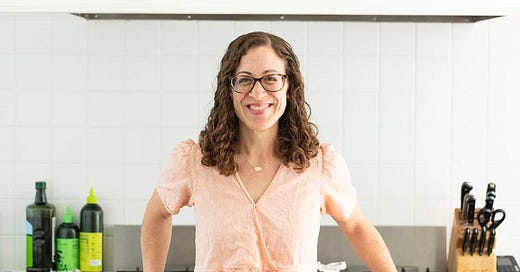





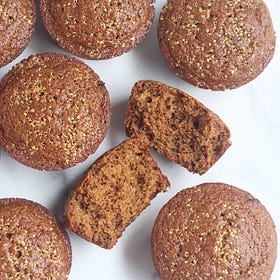

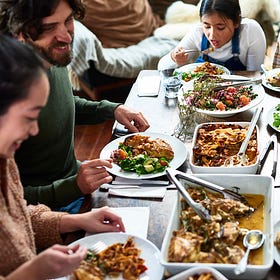
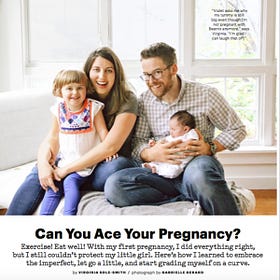


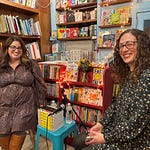

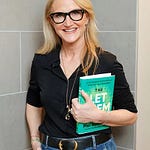
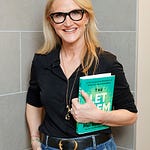




Share this post